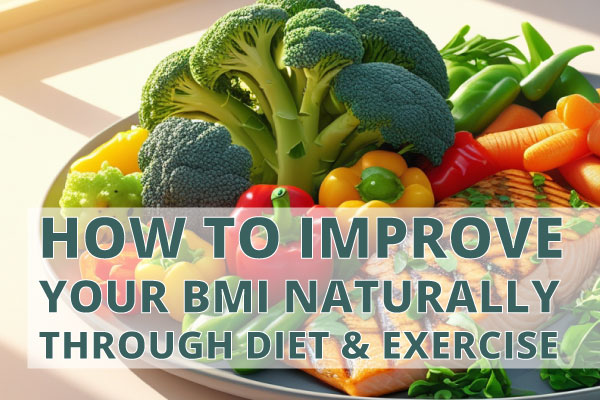How to Improve Your BMI Naturally Through Diet & Exercise
How to Improve Your BMI Naturally Through Diet & Exercise
Your Body Mass Index (BMI) is one of the simplest ways to assess whether your weight falls within a healthy range. While it doesn’t measure body fat directly, it’s a useful tool for identifying potential risks related to obesity, underweight, or overweight. Improving your BMI naturally is possible with the right combination of diet, exercise, and lifestyle choices. In this guide, we’ll explore how to achieve and maintain a healthy BMI safely and effectively.
What is BMI?
BMI (Body Mass Index) is a calculation derived from your weight and height. According to the World Health Organization (WHO), BMI categories are defined as:
- Underweight: BMI less than 18.5
- Normal weight: BMI between 18.5 – 24.9
- Overweight: BMI between 25 – 29.9
- Obesity: BMI 30 or higher
If you’re not sure where you stand, you can easily Calculate BMI online with accurate results.
Why is a Healthy BMI Important?
Maintaining a normal BMI reduces the risk of chronic diseases such as heart disease, diabetes, hypertension, and certain cancers. It also improves energy levels, mobility, and overall quality of life. On the other hand, being underweight can weaken immunity and increase the risk of nutrient deficiencies.
How to Improve Your BMI Naturally
Improving your BMI isn’t about quick fixes. It’s about sustainable habits that balance nutrition and physical activity. Here are effective strategies:
1. Adopt a Balanced Diet
Your diet is the most powerful tool for managing your weight. Focus on nutrient-rich foods while limiting processed and high-sugar items.
- Increase fruits and vegetables: They are low in calories and high in vitamins, minerals, and fiber.
- Choose lean proteins: Include chicken, fish, legumes, tofu, and eggs.
- Whole grains over refined carbs: Opt for oats, brown rice, quinoa, and whole wheat bread.
- Healthy fats: Avocados, nuts, seeds, and olive oil help balance hormones and improve satiety.
- Portion control: Even healthy foods can cause weight gain if portions are excessive.
2. Stay Hydrated
Sometimes thirst is mistaken for hunger. Drinking water before meals can reduce unnecessary calorie intake. Aim for at least 8 glasses a day, and include hydrating foods like watermelon and cucumber.
3. Exercise Regularly
Exercise is essential to both lower and maintain BMI. The combination of aerobic workouts and strength training ensures fat loss and muscle gain.
- Aerobic exercises: Walking, jogging, swimming, cycling, and dancing burn calories effectively.
- Strength training: Building muscle increases your metabolism and helps long-term weight management.
- Flexibility & balance: Yoga and Pilates improve posture and reduce injury risk.
The WHO recommends at least 150 minutes of moderate-intensity or 75 minutes of vigorous-intensity activity per week.
4. Improve Sleep Quality
Lack of sleep can trigger hunger hormones and lead to weight gain. Aim for 7–9 hours of quality sleep each night.
5. Manage Stress
Chronic stress increases cortisol levels, which can promote fat storage. Try meditation, breathing exercises, or engaging hobbies to reduce stress.
6. Avoid Fad Diets
Crash diets may lead to rapid weight loss, but they are unsustainable and can harm metabolism. Instead, focus on long-term eating habits you can maintain.
7. Track Your Progress
Use tools like BMI calculators, fitness apps, or a journal to track weight changes, dietary habits, and exercise routines. This makes it easier to stay accountable.
Sample Diet Plan for Healthy BMI
- Breakfast: Oatmeal with berries and nuts
- Snack: Apple slices with peanut butter
- Lunch: Grilled chicken salad with quinoa
- Snack: Greek yogurt with chia seeds
- Dinner: Baked salmon with steamed vegetables and brown rice
Sample Exercise Plan
- Day 1: 30 minutes brisk walking + 15 minutes bodyweight exercises
- Day 2: Strength training (upper body) + yoga
- Day 3: Swimming or cycling for 40 minutes
- Day 4: Rest day with light stretching
- Day 5: Jogging + core exercises
- Day 6: Full-body strength training
- Day 7: Hiking or recreational sports
Conclusion
Improving your BMI naturally requires a balance of healthy eating, consistent physical activity, and positive lifestyle habits. By making gradual, sustainable changes, you can not only achieve a healthy BMI but also maintain it for life. Remember: the journey is not about perfection but about progress.
FAQs
1. How long does it take to improve BMI?
It depends on your starting point and lifestyle. With consistent effort, noticeable changes can be seen in 2–3 months.
2. Can I reduce my BMI without exercise?
Diet alone can help reduce BMI, but combining it with exercise is more effective for long-term results and muscle preservation.
3. What is the healthiest way to increase BMI?
If you are underweight, focus on increasing calorie intake with nutrient-rich foods, strength training, and healthy fats.
4. Is BMI the only measure of health?
No. BMI is a useful screening tool, but factors like muscle mass, waist circumference, and overall lifestyle also matter.
5. How often should I check my BMI?
Checking every 1–2 months is enough to track meaningful progress without unnecessary stress.







